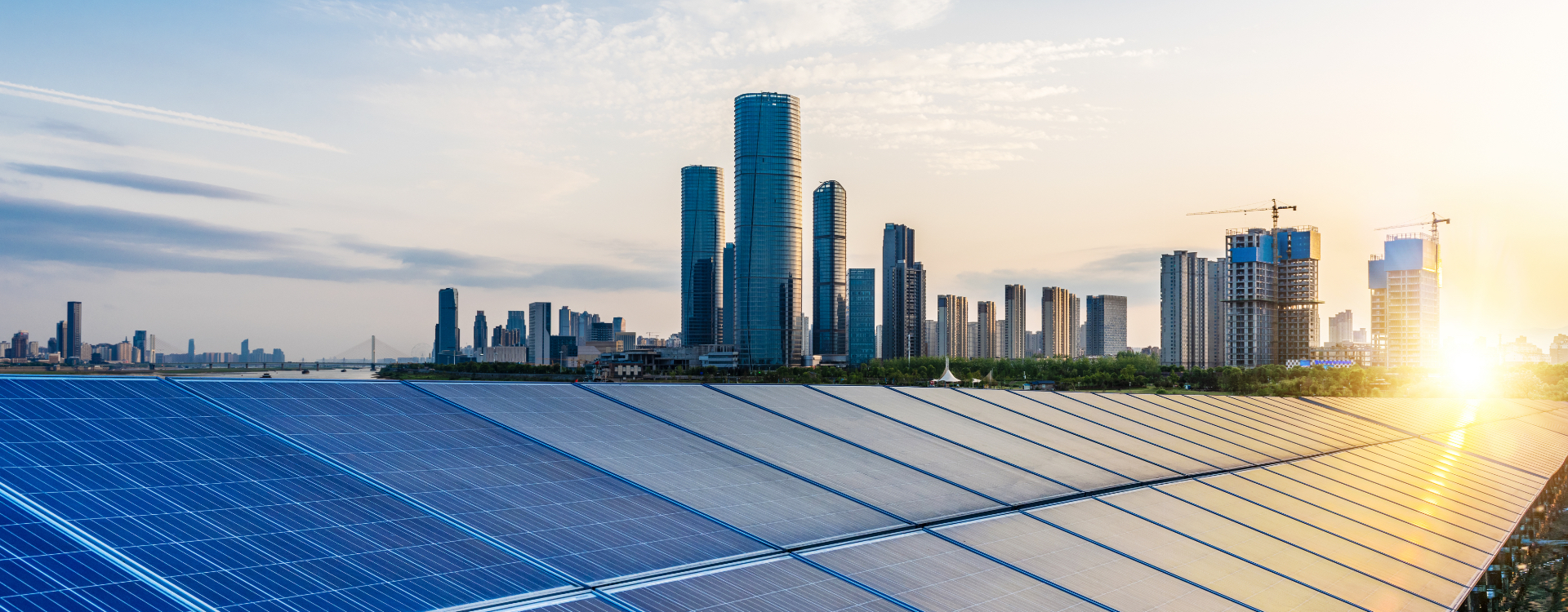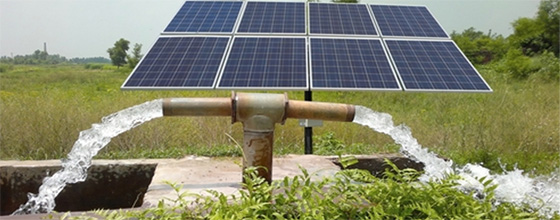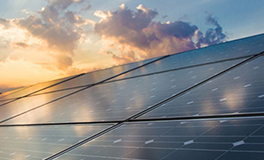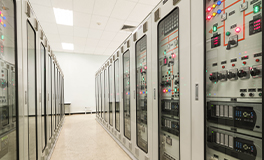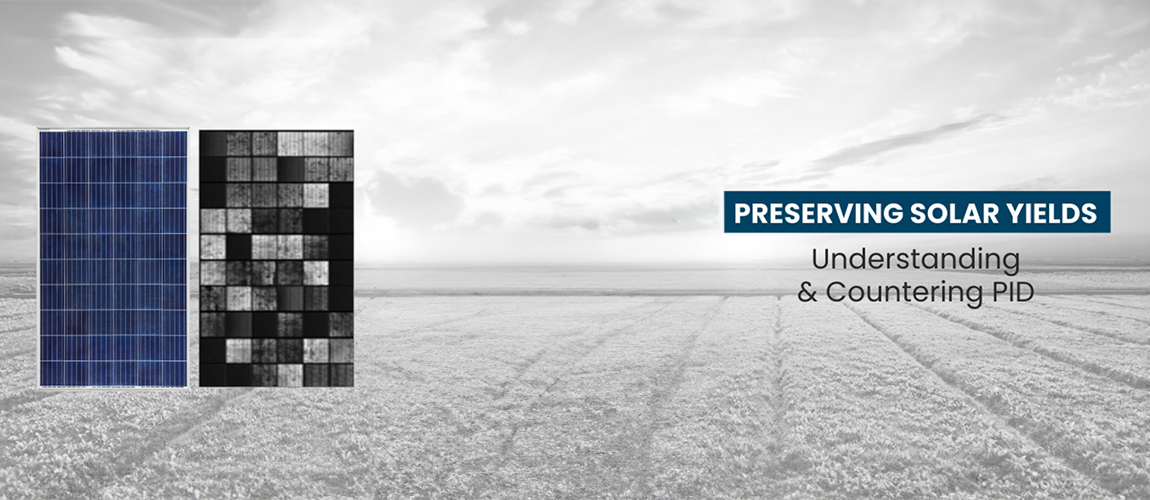Solar energy has long been hailed as a clean and sustainable alternative to conventional power sources. The widespread adoption of solar photovoltaic (PV) technology has significantly contributed to reducing carbon footprints. However, amidst the success stories, a silent threat called “Potential Induced Degradation” (PID) is impacting solar energy yields. In this blog post, we delve into what PID is, its causes, and potential solutions to mitigate its effects.
What is Potentially Induced Degradation?
PID is a phenomenon that can cause a significant drop in the efficiency of solar panels over time. It occurs when a voltage potential exists between the solar cells and the grounded frame of the PV module. This potential difference can lead to the flow of electric current, resulting in the degradation of the solar panel and hence impacts performance.
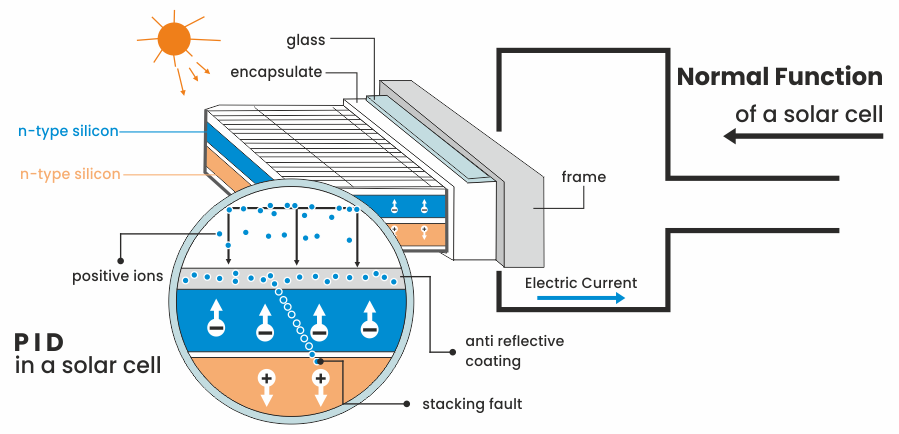
Electric current generated in a solar cell moves through well-defined paths called busbars and cell fingers. The electric current generated at the cell level follows designated paths before reaching the inverter. But sometimes, due to stray potentials, the charged electrons move towards the ground through the encapsulant and frame of the solar panel. This phenomenon degrades the solar efficiency and is called Potential Induced Degradation.
Causes of PID
- High System Voltage :
Systems with high-voltage operations are more susceptible to PID. Higher voltages increase the likelihood of potential differences between the solar cells and the grounded frame.
System voltages of 1500V have become common. But higher the voltage, higher is the potential difference between the panel and the ground terminal, resulting in elevated chances of PID cases. - Humidity & Temperature :
PID tends to be more pronounced in regions with high humidity and elevated temperatures. These environmental conditions enhance the ion movement, accelerating the degradation process.
In a solar panel, solar cells are packed between the glass and an encapsulant, which is generally EVA (Ethyl Vinyl Acetate). In hot and humid conditions, a low-quality EVA loses its dielectric strength, thereby providing an easy passage to electrons, thus increasing the chances of PID.
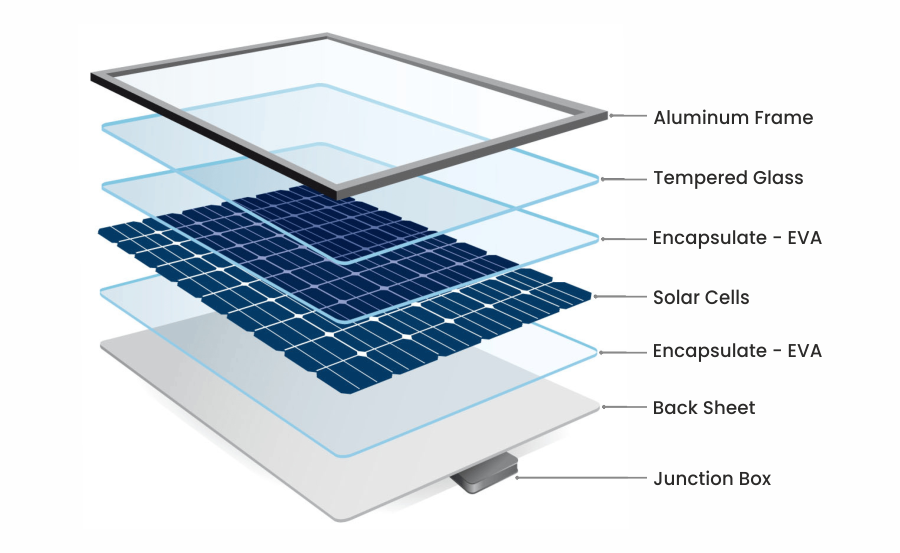
- Inferior Material Quality:
The use of substandard materials in solar panels, such as low-quality encapsulation materials or poorly manufactured modules, can contribute to the development of PID.
High sodium content in the glass can result in sodium ionization on the glass surface, increasing the electron conductivity.
Premium solar panel manufacturers utilize anti-reflective coating on the glass to increase light absorption. This layer is a dielectric coating that hinders stray electron flow, thus mitigating PID. - System Design Issues :
Poorly designed solar power systems, including inadequate grounding or improper installation techniques, can create conditions conducive to PID.
How Does PID Effect the Solar Panel Yield?
PID is a complex phenomenon involving multiple factors affecting the solar panel. However, the overall effect on the solar panels is fairly simple; that is reduction in the yield of the solar panels.
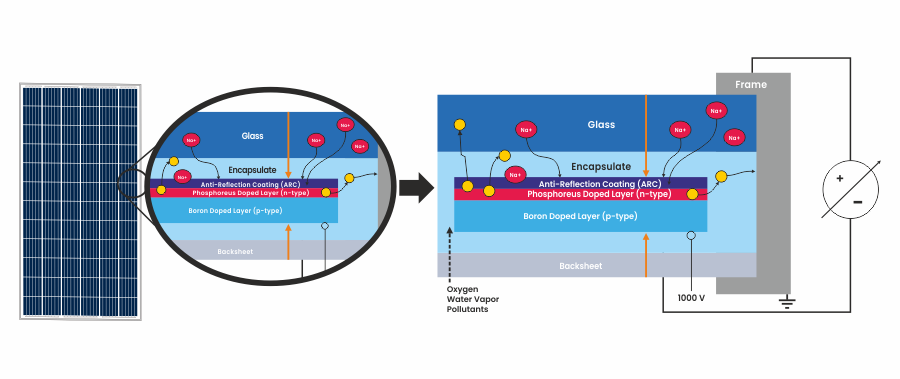
A solar system consists of multiple panels connected in an array called a string. Compared with the ground, the voltage has both negative and positive potential. It is the negative potential that triggers PID in a solar cell, attracting positive ions in the cell, such as sodium ions stimulating surface polarization and shunting. This movement happens typically from the glass plate through the encapsulation and anti-reflective coating to reach the cell. Subsequently, electron flow comes to a halt, giving rise to electricity generation. This leads to disturbances in junction functionality, causing a decrease in the yield of the solar panel.
PID basically affects the Voc and fill factor of the solar module, which can lead to a reduction in the output to about 30% of the rated output. With the passage of time, the losses accentuate and may reach as high as 90% of rated output.
- Defense Strategies to Mitigate PID : Mitigating PID requires a combination of preventive measures during the design and installation of the solar PV system, as well as thoughtful caution while procuring solar panels.
- PID-Resistant/Free Modules : It is very important to have PID-resistant solar panels from well-known solar panel manufacturers. These PID-resistant solar panels are specially designed to resist stray electron flow during potential differences in the solar panel.
- Proper Grounding : Effective system grounding is the key to eliminating potential difference buildups in the solar panel that lead to PID. It is necessary to make sure that the system is provided with adequate negative grounding on DC side (solar Panels) and the AC side (Inverter).
- String Inverters with PID Recovery Functionality : String inverters can be specially equipped with recovery functionality that applies a corrective action, often by application of a negative voltage to counteract PID effect on solar cells. This proactive approach helps to restore the performance of affected solar modules and prevent further deterioration over time, thus enhancing the longevity and efficiency of the solar system.
Conclusion
Preserving solar yields and ensuring the long-term efficiency of PV systems requires a comprehensive understanding of potential-induced degradation. By addressing the causes of PID and implementing proactive measures, such as investing in high-quality solar panels, employing sound system designs and implementing regular monitoring and maintenance, the solar industry can safeguard investments and ensure reliable clean energy for the future. As the demand for solar energy continues to grow, combating PID becomes paramount in achieving full potential of solar energy.
About LUBI Electronics
LUBI Electronics is a leading company in India, exhibiting expertise in the automation, solar, and control panel industry.
Our solar offerings include best-in-class solar modules, solar pumps, solar pump controllers and solar inverters.
For more information on our offerings, please reach out to us at lubi@lubielectronics.com.

